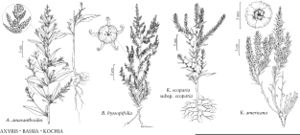Difference between revisions of "Kochia americana"
Proc. Amer. Acad. Arts 9: 93. 1874.
FNA>Volume Importer |
FNA>Volume Importer |
||
| Line 11: | Line 11: | ||
|name=Bassia americana | |name=Bassia americana | ||
|authority=(S. Watson) A. J. Scott | |authority=(S. Watson) A. J. Scott | ||
| − | }}{{Treatment/ID/Synonym | + | }} {{Treatment/ID/Synonym |
|name=Kochia americana var. vestita | |name=Kochia americana var. vestita | ||
|authority=S. Watson | |authority=S. Watson | ||
| − | }}{{Treatment/ID/Synonym | + | }} {{Treatment/ID/Synonym |
|name=Kochia vestita | |name=Kochia vestita | ||
|authority=unknown | |authority=unknown | ||
| Line 32: | Line 32: | ||
|elevation=500-2100 m | |elevation=500-2100 m | ||
|distribution=Ariz.;Calif.;Colo.;Idaho;Mont.;Nev.;N.Mex.;Oreg.;Tex.;Utah;Wyo.;n Mexico. | |distribution=Ariz.;Calif.;Colo.;Idaho;Mont.;Nev.;N.Mex.;Oreg.;Tex.;Utah;Wyo.;n Mexico. | ||
| − | |discussion=<p>Densely pubescent plants may be recognized as Kochia americana var. vestita S. Watson. Additional study variability and phylogenetic patterns of K. americana would be very desirable.</p><!-- | + | |discussion=<p>Densely pubescent plants may be recognized as <i>Kochia americana</i> var. vestita S. Watson. Additional study variability and phylogenetic patterns of <i>K. americana</i> would be very desirable.</p><!-- |
| − | --><p>Previously, this native North American species was erroneously referred to as Kochia prostrata auct. fl. Amer. Bor., non (Linnaeus) Schrader. Indeed, these species are habitually quite similar. Kochia prostrata (Linnaeus) Schrader, the Eurasian subshrub 15–100(–150) cm tall, with linear to filiform, flat or scarcely fleshy leaves 5–25 × 1–2 mm, is known in North American range management literature as “forage kochia” or “prostrate summer-cypress.” It is extremely variable morphologically and widely distributed in Eurasia, especially in steppe, semidesert, and desert zones. This species is being tested and already used locally as a potential forage plant for western United States ranges and has been an escaped or naturalized alien in Utah and adjacent states (W. A. Keller and A. T. Bleak 1974; S. L. Welsh 1984). It was reported as cultivated in Arizona, Colorado, Idaho, Montana, Nevada, New Mexico, Oregon, and Washington.</p> | + | --><p>Previously, this native North American species was erroneously referred to as <i>Kochia</i> prostrata auct. fl. Amer. Bor., non (Linnaeus) Schrader. Indeed, these species are habitually quite similar. <i>Kochia</i> prostrata (Linnaeus) Schrader, the Eurasian subshrub 15–100(–150) cm tall, with linear to filiform, flat or scarcely fleshy leaves 5–25 × 1–2 mm, is known in North American range management literature as “forage kochia” or “prostrate summer-cypress.” It is extremely variable morphologically and widely distributed in Eurasia, especially in steppe, semidesert, and desert zones. This species is being tested and already used locally as a potential forage plant for western United States ranges and has been an escaped or naturalized alien in Utah and adjacent states (W. A. Keller and A. T. Bleak 1974; S. L. Welsh 1984). It was reported as cultivated in Arizona, Colorado, Idaho, Montana, <i>Nevada</i>, New Mexico, Oregon, and Washington.</p> |
|tables= | |tables= | ||
|references= | |references= | ||
| Line 57: | Line 57: | ||
|publication year=1874 | |publication year=1874 | ||
|special status= | |special status= | ||
| − | |source xml=https://jpend@bitbucket.org/aafc-mbb/fna-data-curation.git/src/ | + | |source xml=https://jpend@bitbucket.org/aafc-mbb/fna-data-curation.git/src/8f726806613d60c220dc4493de13607dd3150896/coarse_grained_fna_xml/V4/V4_603.xml |
|genus=Kochia | |genus=Kochia | ||
|section=Kochia sect. Neokochia | |section=Kochia sect. Neokochia | ||
Revision as of 18:29, 18 September 2019
Plants whitish gray or grayish green, 5–35(–50) cm, tomentose-sericeous or almost glabrous. Stems erect or ascending, simple or branched only at base; branches ± erect. Leaves sessile, overlapping; blade linear, terete or semiterete, 4–25 × 0.5–2 mm, sericeous or almost glabrous. Inflorescences spicate; 1–4-flowered in axils of bracts. Perianth segments white-tomentose or sometimes glabrate.
Phenology: Flowering late summer–fall.
Habitat: Alkaline soils, semideserts and deserts, dry lake margins, eroded mountain slopes, sometimes disturbed seminatural habitats
Elevation: 500-2100 m
Distribution
Ariz., Calif., Colo., Idaho, Mont., Nev., N.Mex., Oreg., Tex., Utah, Wyo., n Mexico.
Discussion
Densely pubescent plants may be recognized as Kochia americana var. vestita S. Watson. Additional study variability and phylogenetic patterns of K. americana would be very desirable.
Previously, this native North American species was erroneously referred to as Kochia prostrata auct. fl. Amer. Bor., non (Linnaeus) Schrader. Indeed, these species are habitually quite similar. Kochia prostrata (Linnaeus) Schrader, the Eurasian subshrub 15–100(–150) cm tall, with linear to filiform, flat or scarcely fleshy leaves 5–25 × 1–2 mm, is known in North American range management literature as “forage kochia” or “prostrate summer-cypress.” It is extremely variable morphologically and widely distributed in Eurasia, especially in steppe, semidesert, and desert zones. This species is being tested and already used locally as a potential forage plant for western United States ranges and has been an escaped or naturalized alien in Utah and adjacent states (W. A. Keller and A. T. Bleak 1974; S. L. Welsh 1984). It was reported as cultivated in Arizona, Colorado, Idaho, Montana, Nevada, New Mexico, Oregon, and Washington.
Selected References
None.
